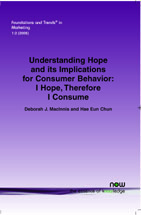Understanding Hope and its Implications for Consumer Behavior: I Hope, Therefore I Consume
By Deborah J. MacInnis, Marshall School of Business, Marketing Department, University of Southern California, USA, macinnis@.usc.edu | Hae Eun Chun, Marshall School of Business, Marketing Department, University of Southern California, USA, haechun@usc.edu
Abstract
Building on prior work (MacInnis and de Mello (2005) 'The concept of hope and its relevance to product evaluation and choice'. Journal of Marketing69(January), 1–14; de Mello and MacInnis (2005) 'Why and how consumers hope: Motivated reasoning and the marketplace'. Inside Consumption: Consumer Motives, Goals, and Desires, S. Ratneshwar and D. G. Mick (eds.). London/New York: Routledge, pp. 44–66), the authors argue that the concept of hope is highly relevant to consumer behavior and marketing, though its study has not yet appeared in these literatures. Complicating this study is that the definition of hope across literatures is inconsistent. The purpose of this conceptual article is to articulate the concept of hope and elucidate its relevance to consumer behavior. We do so in six sections. The first section explores the conceptual meaning of hope. A definition of hope and the constituent elements that underlie it is articulated. We compare this definition to ones provided elsewhere and differentiate hope from related terms like wishing, expectations, involvement, and faith. The second section focuses on what consumers hope for. The third section considers several important consumer relevant outcomes of hope, including biased processing and self-deception, risk taking behavior, product satisfaction, and life satisfaction and materialism. The fourth section addresses the extent to which marketers are purveyors of hope and what tactics they use to induce hope in consumers. The fifth section uses the conceptualization of hope to both discuss novel ways of measuring hope and their comparisons to existing hope measures. The final section addresses a set of interesting, yet unresolved questions about hope and consumer behavior.
Understanding Hope and its Implications for Consumer Behavior
A notable human capacity is the ability to look to the future and aspire to achieve desired states – what we hope for instead of what we are and where we are. The marketplace provides rich sources of hope and invites us to the endless pursuit of happiness. Hope also finds relevance within a broader realm of human behavior – along with faith and charity, it is one of the three fundamental theological Christian virtues. Despite its relevance to human behavior in general and consumer behavior in particular, little has been written about the concept of hope. Furthermore, while some researchers recognize its importance, definitions in the psychology, sociology, philosophy, medical, and religion literatures often conceptualize hope in different ways. Understanding Hope and its Implications for Consumer Behavior sheds light on the relevance and importance of hope to consumer behavior. The authors explore the conceptual meaning of hope and a definition of hope and the constituent elements that underlie it is articulated. The monograph focuses on what consumers hope for and considers several important consumer relevant outcomes of hope, including biased processing and self-deception, risk taking behavior, product satisfaction, and life satisfaction and materialism. The authors look at the extent to which marketers are purveyors of hope and what tactics they use to induce hope in consumers. Using the conceptualization of hope, the authors explore novel ways of measuring hope and their comparisons to existing hope measures. The final section addresses a set of interesting, yet unresolved questions about hope and consumer behavior. Understanding Hope and its Implications for Consumer Behavior is the most comprehensive and current examination of the concept of hope in marketing and business.
